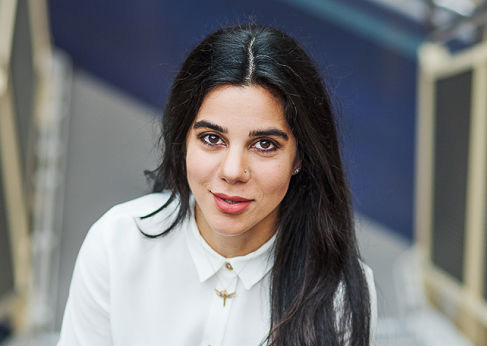Congratulations to NCMM Group Leader, Irep Gözen, on receiving a prestigious Young Research Talent grant from Forskningsrådet (The Research Council of Norway).
Dr Gözen, who is head of the Bionanotechnology and Membrane Systems Group, was awarded funding for her project, ‘Nano-and Micro-Materials Interfaces for Migratory Artificial Cells’. The project is funded for a total of four years and will focus on the study of the biophysical mechanisms of cellular migration; an aspect of cell migration that is still not fully understood.
New routes of investigation to understand the materials-associated processes at the interfaces between a migrating cell and its environment
Biological cells migrate to perform tasks essential for life, and are associated with disease development. For example, wounds on our skin close and heal thanks to the migration of cells around the circumference of the wound. Malignant tumours also spread through the migration of cancer cells.
Despite the known roles of cell migration in these instances, the biophysical mechanisms of cellular migration are not yet sufficiently understood. Research to date has, generally, investigated these problems exclusively from a molecular biology perspective, where genetic mechanisms suspected of playing a role in migration are manipulated; with observations focused on how the genetically manipulated cells differ from the native ones.
Whilst huge progress has been made in terms of building an understanding from a molecular biology perspective, the materials-associated processes at the interfaces between a migrating cell and its environment have, so far, received little attention.
Project will focus on soft- and hard matter solid surfaces, with hopes to enable new research into areas such as the spread of cancer
While migration is occurring, cells continuously interact in a complex manner with the contact areas they establish on surfaces, and with the surrounding chemical and physical environment. Migration is highly dependent on how cells perceive the interface they migrate to.
Dr Gözen comments, “I am extremely pleased to have been awarded the Young Research Talent grant, and to have had the importance of my research recognised in this way.
“My project will take a new alternative route of investigation, and will focus on investigating soft- and hard matter solid interfaces, with the aim to engineer substrates at the nano- and microscale to study their interaction with simplified, minimal cell models. My research hopes to find ways in which to address a wider range of health-related challenges associated with migration, and enable new research directions with high application value, such as preventing the spread of cancerous tumours.”
About the Young Research Talent grant
The Young Talent Grant is awarded to promising young researchers, and aims to give them the opportunity and independence to further develop their own ideas.
